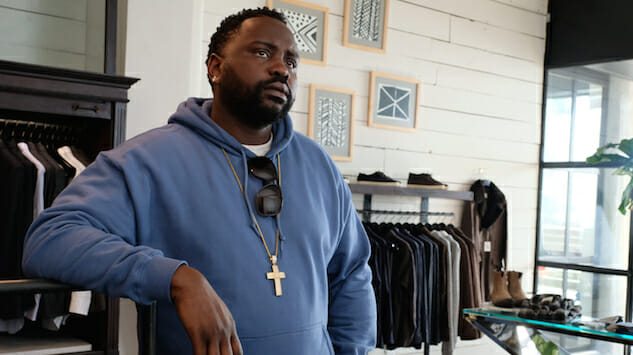Atlanta: Brian Tyree Henry Earns His (Hopefully Forthcoming) Emmy with “Woods”
(Episode 2.08)
Photo: Curtis Baker/FX TV Reviews atlanta
If you thought Westworld was going to be the only show making you question what was really “real” this week, you thought wrong. Atlanta’s been getting into the existential game all season, and “Woods” is one of its most potent statements. Paper Boi’s (Brian Tyree Henry) depressed malaise is told through the deflated blocking (courtesy of director Hiro Murai) and the poignant passage of time (as written by Stefani Robinson). He’s paralyzed. The couch is his captor, making him watching the sunlight travel across the room and wait until his mother has left the apartment.
But with Sierra (Angela Wildflower, excellent at balancing vapidity and emotional complexity), Paper Boi can be himself. His sad-sack, Garfield-sass-slinging self has someone to appreciate it. A little touch of laughter, that small bit of connection, is something he’s been missing. And, from what it sounds like, something Sierra’s been missing too.
Nobody wants their idols to look like them. People want to live in a fantasy where at the end of their aspirations is something different and not the same problems with a different cash flow. This lets the series rag on how bad Earn (Donald Glover) is as a manager while reiterating its larger thesis for the season: Everyone’s the same, and everyone’s taking.
That applies even when his celebrity date (OK, Instagram celebrity) talks fans. She loves them, but only because she’s learned how to utilize their power. And now, she’s ready to utilize Paper Boi’s. What is a celebrity power couple if not a brand merger? It’s the saddest thing in the season and it’s so breezily sold that it must be true. So when Paper Boi storms out of the nail salon, it’s a revolt against Sierra’s particular brand of fame and the “fakeness” that accompanies the hardcore self-capitalization that accompanies it. Rapping might be what he got himself started with, but it’s certainly not all he got himself into.
The old-school musician has an outdated idea of fame, one that doesn’t involve monetizing his personality, relationships, or day-to-day activities. So he escapes. He runs. Nothing’s more real than beating feet across melancholic, bluish garages and burger joint parking lots. Well, maybe getting mugged by a couple of fans seizing an opportunity. The tension and eruption of that fight is as brutal as anything in the season, mostly thanks to the subtleties of the actors involved. Nothing goes from “Oh hey, I’m a fan” to “Oh hey, a mark” quicker than a few perfectly edited silent nods.
It’s more room for Henry to earn his Emmy for the season—partly because of his acting and partly for being such an exquisite canvas for Murai to film. No shot of him is ever boring. Something is always moving or challenging us to figure out why it’s still. That goes for the woods he finds himself in after the robbery. It’s a place where “real” and “natural” aren’t necessarily synonyms and things in fact have a heightened sense of fantasy about them. The sound design creaks and hums like Lord of the Rings’ Fangorn forest, while death and madness lurk around every corner in the form of a deer corpse and a Chapstick-hocking homeless man. Suddenly that sweaty strip mall seems like home.
Pursuing false ideals of realness hasn’t gotten Paper Boi much success so far, and while I’m no Tarot expert, these wooded omens certainly don’t look great for his future. This is the rapper’s oddball coming-of-age, where he’s gotta have some professional growing up. But rather than taking, like, a business seminar, he has an old dude hold a box cutter to his throat by a fallen tree. Atlanta: It’s a comedy!
The moral of it all is that, hell, taking some pictures with fans in a gas station isn’t so bad after you just had life whip your ass for a full day. It’s a delicate tightrope between utter cynicism and utter earnestness, as the philosophy of how one should manage one’s public persona and fanbase is a topic of interest for the series’ creator and its stars. Giving in to the selfie demands and status updates might seem like a defeat, but given how unpredictable people can be when you’re not tightly moderating your interactions with them… well, maybe simulated realness is all you really need.
Jacob Oller is a writer and film critic whose writing has appeared in The Guardian, Playboy, Roger Ebert, Film School Rejects, Chicagoist, Vague Visages, and other publications. He lives in Chicago, plays Dungeons and Dragons, and struggles not to kill his two cats daily. You can follow him on Twitter here: @jacoboller.